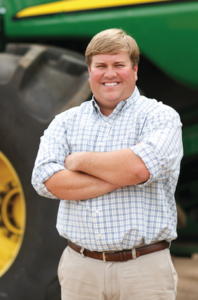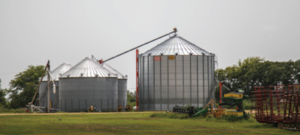By Mark H. Stowers • Photography by Austin Britt
 Farm shops come in all shapes and sizes with technology that dates back to the invention of electricity moving forward. For Jim Pegram, he’s happy to stay “old school” and keep using what works for him and his help. The Ole Miss graduate grew up watching his grandfather farm while his dad worked at the local John Deere dealership. Needless to say, Pegram Farms “runs like a Deere” and is all green when it comes to machinery.
Farm shops come in all shapes and sizes with technology that dates back to the invention of electricity moving forward. For Jim Pegram, he’s happy to stay “old school” and keep using what works for him and his help. The Ole Miss graduate grew up watching his grandfather farm while his dad worked at the local John Deere dealership. Needless to say, Pegram Farms “runs like a Deere” and is all green when it comes to machinery.
“I’m a young farmer. This will be my sixth harvest,” Pegram says. “My dad, my grandad and my great-granddad all farmed. In the 80s when things were rough, they downsized the farm.”
His parents dissuaded him from the turnrow life.
“They said, ‘we don’t have enough land.’ I went to Ole Miss and majored in Managerial Finance. Even after college I went to work for Farm Bureau, but my dad always kept the farm and worked for the John Deere dealership in Tunica, Parker Tractor and Implement Company. My grandad ran the farm just to give him something to do.”
Pegram’s plan was to learn the ropes from his grandfather but before the lessons were completed he passed away from cancer.
“I helped my grandfather get his last crop out and I feel in love with the process and I knew after that experience I wanted to give farming a try. I started expanding the farm from there. In the past six years we have gone from 600-700 acres to over 3,000 acres,” Pegram says. “We’re growing at a pace we can afford.”
The thirty-one year old enjoys tinkering around the shop fixing and maintaining the farm equipment with his seven full-time workers and a few more during the harvest. His wife, Claire, grew up on a farm and understands the needs. Now with three boys, Clyde, Luke and Will, Pegram has his hands full on and off the turnrow.
full-time workers and a few more during the harvest. His wife, Claire, grew up on a farm and understands the needs. Now with three boys, Clyde, Luke and Will, Pegram has his hands full on and off the turnrow.
“My older boys love the lifestyle and they call themselves “farming” all day in the back yard. Our house is right next to my parents’ house and our shop is just three hundred feet away. The boys have a great collection of John Deere toy tractors,” he says. “I absolutely love that we built a house so close to my shop that I can see them playing and enjoying the whole farm lifestyle.
This year Pegram is farming cotton, rice and soybeans. We got out of the cotton business for a while but we started back last year. However it is rice that has really been a game changer for us from a profit standpoint.
Even in his short time farming, Pegram has learned two valuable lessons.
“You’ve got to have a good equipment dealership and a friendly banker and I have both,” he says. Both of these relationships come in handy when you want to improve things on your farm. “I love taking land and making it better. A lot of our land had not been developed, but I fell in love with taking a piece of dirt that people don’t think is any good and turn that unproductive farm into a productive one.”
The finance side of his education comes into play as he enjoys crunching the numbers and figuring out the selling of his commodities as well.
“I honestly love every aspect of the job. I still like to drive equipment, in fact I was on a tractor recently knocking rice levees down,” he says. “As much as I love getting dirty and being out in the fields, nowadays it cost so much to farm and equipment costs so much, you can’t leave anything on the table, so I realize that it is very important that I spend adequate time staying on top of the finances. That is something that I have a tough time turning over to other people.”
Pegram’s “old school shop” has been around more than forty years.
“It’s nothing fancy but I feel it is sufficient for our needs here on the farm. It’s just big enough to pull one piece of equipment under it at a time to work on it,” he says. “But we can store a little bit of other stuff. It’s truly an old school working shop it is certainly nothing pretty.”
His workers are all old school as well and enjoy the open area to work in according to Pegram.
“All of my guys are older and they’ve been with me forever and they know what needs to get done. They like being here and it’s a real laid-back atmosphere,” Pegram says. “They know to take their time and not get too hot. It’s an active shop with always something going on.”
Pegram notes that the shop is up to date as needed. The open air shed/shop does have one room that is enclosed but we really don’t pull any equipment into that area. That area was probably utilized years ago but when the shop was initially built equipment was a lot smaller than it is today.
The shop includes welding equipment with plenty of his family’s DNA on each piece.
“Welding was my grandfather’s passion. He was self-taught, and he would weld every one of his grandchildren a nice, welded table that you’d put a TV on. “We have a lot of heavy-duty iron tables that he built over the years. Due to the fact that his grandfather loved welding the shop has three different types of welders and several air compressors and scrap metal. One thing is for certain on a farm, you never know when you’ll need some scrap iron to fix something,” says Pegram.
Pegram regrets not spending more time with his welding grandfather, but keeps a piece of his artwork in the shop as a constant reminder of his heritage.
“If he had lived another year or so, I probably would have learned more from him,” Pegram says. “We have a table in the shop he started. He would always make a nice metal table each year for the school to raffle off. The wrought iron table he was working on when he died is still there. Maybe one day I’ll decide to finish it, but I like it sitting there in the shop.”
Pegram is quick to point out that his farming education comes from neighbors and other farming professionals in the area.
“Tunica has some really good farmers. I can’t tell you how many times I pick up the phone and call the farmers around me to get some ideas. They’ve seen a lot of these problems that I’m seeing for the first time. They are all willing to talk me through things and help me out,” he says. “I rely on our county agent as well and he’s really good at keeping us informed about the newest trends/technology especially with our spraying. We have a great NRCS office. In Tunica, we’re fortunate. It’s really an amazing farming community.”
